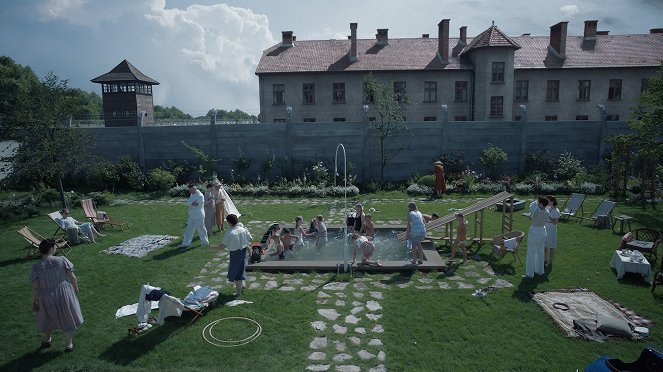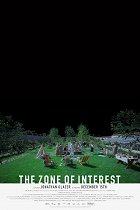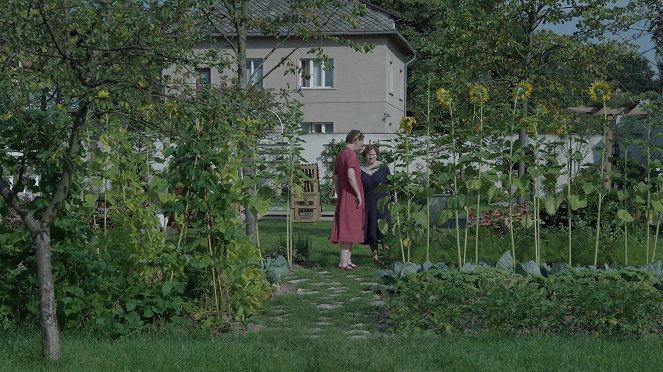Directed by:
Jonathan GlazerScreenplay:
Jonathan GlazerCinematography:
Łukasz ŻalComposer:
Mica LeviCast:
Sandra Hüller, Christian Friedel, Ralph Herforth, Freya Kreutzkam, Max Beck, Ralf Zillmann, Imogen Kogge, Stephanie Petrowitz, Marie Rosa Tietjen (more)VOD (3)
Plots(1)
The commandant of Auschwitz, Rudolf Höss, and his wife Hedwig, strive to build a dream life for their family in a house and garden next to the camp. (SF Studios Fin.)
Videos (4)
Reviews (10)
A formally interesting experiment (being created concurrently with the book of the same name by Martin Amis), drawing attention to a topic that we should have already processed. Many fundamental questions concerning the primary human attitude, such as "How could the main commander of the Auschwitz concentration camp, Rudolf Höss, calmly sleep, go home every day, and peacefully have dinner with his family...?" should not be posed for the first time by a co-produced film. Similarly, the everyday life of Höss's wife, Hedwig, should not surprise or fascinate us for the first time. On the contrary, we should have a rich knowledge of the reality of the war and be able to work with it. Many prominent women from this time have written memoirs, which in many ways only repeat, complement, and explain to us what and why happened in their lives. They serve excellently as memories, especially the memoirs of secretaries Traudl Junge, Brunhilde Pomsel, and Louise Fox. The question of obedience to authorities and blind fulfillment of orders was thoroughly analyzed by Hannah Arendt in her series of reports "Eichmann in Jerusalem: A Report on the Banality of Evil". Furthermore, we should be immune to demonizing the German language itself and always remember that the Third Reich existed for only 12 years and is primarily the language of Goethe, Schiller, and Rilke. It is absurd to what extent the current public is not interested in the new film Terezín, but the Oscar-nominated The Zone of Interest naturally appeals to moral values and interest in the matter. However, if this trendy film brings some understanding even to those viewers who only watch new titles, this concession can be accepted.
()
Zone of disinterest. One of those films that the teacher puts on in history class, but 80% of the students would rather pull out their cell phones and scroll through Instagram because it's almost as boring as regular class. The film is completely empty in terms of information, so it doesn't even serve an educational purpose. We follow the banalities of the daily life of a concentration camp commander and his family. We learn nothing about the characters, the dialogues are cut down to the minimum, Auschwitz is not shown, so again a film for book readers, where the viewer has to figure everything out (fck you!!), it has no script, the atmosphere doesn't work at all, there’s no build-up, no tension or escalated drama between the Nazis, the emotions below zero, and in the end, instead of showing a pile of corpses, they show only shoes. The film is so empty, slow and boring that even if you skips twenty minutes, you won’t miss anything crucial. Son of Saul was thematically similar, but somewhere else. An intimate arthouse of the highest order. 3/10.
()
Jonathan Glazer is again powerfully creative and artsy. In The Zone of Interest, we don’t see a single Auschwitz prisoner in the film or any of the atrocities perpetrated behind the walls of the camp. The minimalistically staged but effectively arranged action takes place inside the Hösses’ villa and in their garden, which is bordered by the wall, over which the tops of the concentration-camp barracks loom. Höss dutifully goes to “work” and spends his free time with his family. Höss’s wife enjoys the flowers in the garden. Their children play by the swimming pool. Höss occasionally receives a visitor on business, such as engineers with a design for a more efficient crematorium. Sometimes someone brings them a bag of nice clothes to pick through... The whole time, we hear the distant droning of the death factory in operation, sometimes people screaming, dogs barking, gunfire. Black clouds of ash fill the sky. The Höss children’s perception of the world outside the house is also evident in small nuances. The little girl’s nocturnal dreams in black-and-white inverted images are the most impressive of the artistic ornaments with which the film is packed to the maximum satisfaction of the festival viewer. The scene with Höss on the stairs with the dark empty corridors is brilliant and the highlight of the film in my opinion. The Zone of Interest is a different view of the Holocaust, with the most unpleasant music you have ever experienced accompanying the closing credits. This puts Jonathan Glazer in the company of masters like Michael Haneke and Yorgos Lanthimos. [Cannes FF]
()
Auschwitz without the gunfire, the wailing and the dying. An original premise, where a lot can be invented, but where there is also a constant risk of boredom without emotions. Jonathan Glazer comes up with a version that in regular intervals shows ideas to illustrate a typical day of the head honcho of the concentration camp at the gates of Auschwitz. Although there are no downright deaf spots, as a whole, however, the film, in all its ordinariness, fails to be fully engrossing. All credit goes only to some excellent scenes, notably the Sunday fishing or the imprisonment in the greenhouse.
()
Scenes from National Socialist married life and a film whose concept is drawn so tight that it left me feeling oddly indifferent. The idea of transforming a death factory into a 2D backdrop, which Łukasz Żal’s camera literally pushes through the depth of field to the Hösses’ “garden of paradise” is suffocating and oppressive, but it also leads to a certain monotony and risks making the viewer get used to it just as the characters get used to the ubiquitous stench, screaming and moaning. The central couple cannot be humanised to a sufficient extent to form a psychological counterpoint to the horrors of the Holocaust, so I found that there was something mechanical in the Hösses’ routines that made it easier for me to disconnect from the urgency of Glazer’s world. The banality of evil is precisely and literally illustrated. I was reminded of Markus Schleinzer’s similarly conceived and distanced film Michael, which, however, started to be truly impressive at the moment when the character of the blasé paedophile rapist gets an adversary in the form of the victim in a powerful reverse shot. Glazer chooses a similar principle at the end, but in doing so, he breaks the fourth wall in a way that has more intellectual calculation than natural power. Was Höss aware of the moral implications of his actions or was he able to conceal them in the rhetoric of industrial production and historical necessity? This is where the possibilities of Glazer’s film reach their limit. In the ever-powerful deluge of “Holocaust porn”, The Zone of Interest is important for its differentness and its courage to change the perspective, to expose the viewer to the “cognitive dissonance” experienced by the direct perpetrators of evil. It is also an interesting reflection on the central ideological concept of Lebensraum, which in the portrayal of Frau Höss takes the form of a neat garden fertilised with the ashes of the dead. Nevertheless, I enjoy reflecting on the film from a distance significantly more than experiencing it directly on the screen. In that respect, I give preference to the concept of Son of Saul…and to reading the immensely monstrous The Kindly Ones, which went much deeper into the psyches of the architects of the Holocaust than The Zone of Interest.
()
Gallery (12)
Photo © A24



Ads